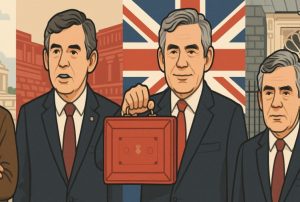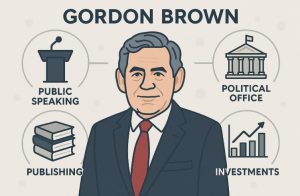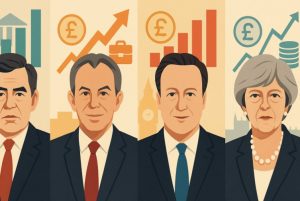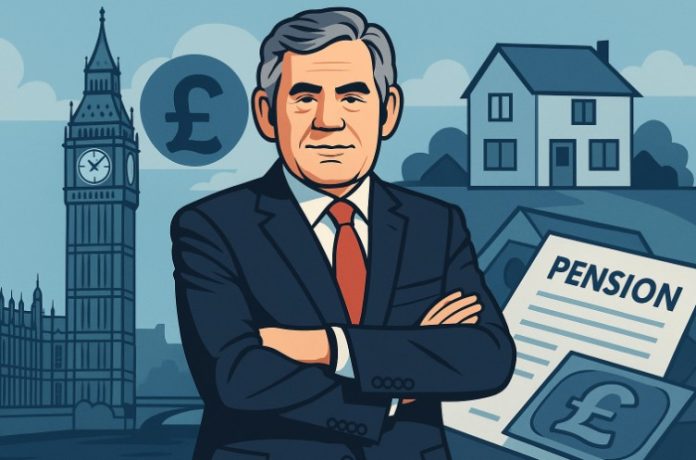Table of Contents
Understanding the personal finances of prominent political figures offers insights not just into their public service, but also their values, choices, and long-term legacy.
One such figure is Gordon Brown, the former Prime Minister of the United Kingdom, whose career spanned decades of public office and global influence.
From leading the country through a financial crisis to advocating for global education, Brown’s journey is as financially complex as it is politically significant.
This article provides a detailed look at Gordon Brown’s net worth, exploring the key components of his income, assets, pensions, and public earnings since leaving office.
What Is Gordon Brown?

Early Life and Education
James Gordon Brown was born on 20 February 1951 in Giffnock, Renfrewshire, Scotland. Raised in a manse in Kirkcaldy, he was deeply influenced by his father, a Church of Scotland minister.
Brown’s education journey was marked by academic excellence. At just 16, he entered the University of Edinburgh, where he earned a First-Class Honours degree in History, followed by a PhD focused on political change in Scotland.
Early Career and Entry into Politics
Before entering Parliament, Brown worked as a lecturer in politics and a journalist for Scottish Television.
He was elected as the Labour MP for Dunfermline East in 1983 and quickly rose through the ranks.
By 1992, he had become Shadow Chancellor of the Exchequer, a position he held until Labour’s general election victory in 1997.
Chancellor of the Exchequer (1997–2007)
Brown served as Chancellor under Prime Minister Tony Blair for a decade, making him the longest-serving Chancellor in modern British history. His tenure included:
- Granting operational independence to the Bank of England
- Overseeing the longest period of economic growth in UK history
- Introducing key welfare reforms and working tax credits
- Implementing the 1999 Windfall Tax on privatised utilities
However, controversial decisions such as the sale of UK gold reserves and the removal of the 10% income tax band in 2007 drew criticism.
Prime Minister (2007–2010)
Brown succeeded Tony Blair as Prime Minister and Labour leader in 2007. His premiership was shaped by the global financial crisis, during which he:
- Nationalised failing banks like RBS and Northern Rock
- Introduced economic stimulus packages
- Passed the Climate Change Act 2008 and the Equality Act 2010
Despite these efforts, Labour lost the 2010 general election, and Brown resigned shortly after.
Post-Premiership Roles and Recognition
After stepping down, Brown remained active in public life. He served as the United Nations Special Envoy for Global Education and in 2021 was appointed WHO Ambassador for Global Health Financing. He has also written extensively on global issues and UK politics.
In 2024, King Charles III awarded Brown the Order of the Companions of Honour for his contributions to public and charitable service, further cementing his status as one of Britain’s most influential political figures.
What Is Gordon Brown’s Current Net Worth?
Gordon Brown’s net worth is currently estimated at $15 million or approximately £11.8 million.
This valuation is based on publicly available information from media outlets, interviews, property records, and financial disclosures.
The figure includes all tangible and intangible assets such as real estate, book royalties, pensions, and income from speaking engagements.
Brown’s financial profile is notably modest compared to other former Prime Ministers, reflecting his long-standing ideological commitment to public service and social justice.
He has consistently chosen to live a quiet, relatively private life, which has also influenced how he manages his finances.
How Did Gordon Brown Accumulate His Wealth?

Gordon Brown’s estimated net worth of $15 million (approximately £11.8 million) did not materialise overnight.
His financial journey spans over four decades and reflects a blend of political earnings, intellectual contributions, post-office engagements, and careful personal management of assets.
Unlike some of his contemporaries who pursued corporate advisory roles after politics, Brown’s financial path has remained aligned with public engagement and advocacy, reinforcing his reputation as a values-driven figure.
Political Salary and Public Office Roles
Brown served as a Member of Parliament from 1983 to 2015, holding increasingly senior positions that culminated in his appointment as Prime Minister from 2007 to 2010. Over his political career, his income was derived primarily from:
- MP salaries across three decades, which ranged from £30,000 in the early 1980s to over £65,000 by the 2000s
- Additional ministerial income as Chancellor of the Exchequer (1997–2007), with an annual salary exceeding £130,000
- Prime Minister’s salary, which stood at around £142,500 per annum during his time in office
Collectively, Brown’s earnings from public office are estimated to have exceeded £2.5 million. While political salaries are subject to UK taxation and not excessive compared to private sector pay, his consistent tenure ensured long-term financial stability.
Book Royalties and Publishing Success
Following his departure from politics, Brown became a respected author, publishing a number of books on economics, leadership, politics, and global affairs. These include:
- Beyond the Crash (2010)
- My Life, Our Times (2017)
- Seven Ways to Change the World (2021)
- Permacrisis (2023), co-authored with economists Mohamed El-Erian and Michael Spence
The royalties from these books, published internationally and often featured on bestseller lists, represent a significant revenue stream. Conservative estimates suggest Brown has earned £500,000 to £1 million through publishing.
Public Speaking Engagements
Brown’s post-premiership visibility led to frequent invitations to speak at global summits, universities, international NGOs, and economic forums.
As a globally recognised figure with expertise in economics and governance, he commands a speaking fee ranging from £25,000 to £50,000 per event.
Many of his speeches focus on education, economic reform, and global cooperation. These engagements have not only enhanced his financial portfolio but also furthered the reach of his advocacy work.
Pensions and Long-Term Income
Gordon Brown also receives a government pension, reflective of his decades in public office. This includes:
- Parliamentary pension for 32 years of service
- Prime Ministerial pension as part of former leaders’ entitlements
Combined, these pensions are estimated to provide him with £60,000 to £70,000 annually, offering a secure financial base.
Professional Offices and Charitable Work
Much of Brown’s post-office work is conducted through The Office of Gordon and Sarah Brown, which oversees income from books and speeches.
Notably, a substantial portion of these earnings is directed toward charitable causes and initiatives in education and global development.
This approach has enabled Brown to accumulate wealth while maintaining alignment with his ethical principles and public service legacy.
What Assets and Investments Does Gordon Brown Own?

Gordon Brown’s tangible wealth is primarily held in real estate. His property ownership is well documented, particularly his homes in London and Scotland.
Key Property Assets Include
- A five-bedroom detached house in North London valued at around £2.4 million, purchased in 2015
- A property in the Scottish Borders, used primarily as a family retreat
Brown and his wife Sarah have avoided extravagant lifestyle choices. Unlike some of his political peers, Brown has not invested heavily in luxury real estate abroad or in high-risk corporate ventures.
Apart from property, there is limited public information about his financial investments. It is assumed that he has savings and investment vehicles common to high-net-worth individuals such as:
- ISAs (Individual Savings Accounts)
- Pension-linked investment funds
- Royalty and trust income management through The Office of Gordon and Sarah Brown
The Office manages the income from his books and speeches and ensures a proportion of that income is directed towards charitable activities.
What Income Does Gordon Brown Receive from His Political Pension?
As a former Member of Parliament, Chancellor, and Prime Minister, Gordon Brown is eligible for one of the most robust pension packages available in UK public service.
His pension includes multiple components:
| Pension Source | Details | Estimated Annual Income |
| Parliamentary Pension | Based on 32 years of service | £40,000–£50,000 |
| Prime Minister’s Pension | Supplement for his role as PM | Around £20,000 |
| Additional Public Service Roles | Includes Chancellor responsibilities | Integrated within MP pension |
These figures place Brown’s total pension earnings in the range of £60,000 to £70,000 per year, a respectable figure that provides a steady base income in retirement.
Unlike some former politicians who receive consultancy payments or corporate retainers, Brown’s post-political income largely consists of pensions and royalties. This aligns with his transparent and low-profile financial approach.
How Much Has Gordon Brown Earned from Books and Public Speaking?

Gordon Brown has written several books that have contributed significantly to his net worth. His writings focus on economic policy, global development, leadership, and his personal political journey.
Notable Books Authored by Brown
- Beyond the Crash: Overcoming the First Crisis of Globalisation
- My Life, Our Times
- Seven Ways to Change the World
- Maxton: A Biography (his early academic work)
These publications have been distributed internationally and translated into several languages.
Though exact royalty figures are private, analysts estimate that Brown could have earned between £500,000 to £1 million from global book sales and related publishing contracts.
His speaking engagements are another significant income stream. After leaving office, Brown became a highly requested speaker at major international forums.
Highlights of his Speaking Income
- Speaking fees estimated between £25,000 to £50,000 per event
- Engagements at the World Economic Forum, UNESCO, global education summits, and university lectures
- Focused themes on global inequality, education policy, and economic resilience
Many of these appearances are managed through The Office of Gordon and Sarah Brown, and a portion of the fees is directed to charitable activities, adding to his legacy rather than personal gain.
What Was Gordon Brown’s Salary as Prime Minister and MP?
Gordon Brown served as an MP for over 30 years and held various high-ranking offices in government. His salaries reflect both his senior roles and long service.
Here is a breakdown of his annual salaries during his political career:
| Role | Years Held | Approximate Annual Salary |
| Member of Parliament (MP) | 1983–2015 | £60,000 to £80,000 |
| Chancellor of the Exchequer | 1997–2007 | £130,000+ |
| Prime Minister | 2007–2010 | £142,500 |
Over the course of his political life, Brown’s cumulative earnings are estimated to have exceeded £2.5 million.
It’s important to note that political salaries are subject to full UK income tax, and Brown is known to have made charitable contributions from his earnings, especially during his time as Prime Minister.
His overall salary history illustrates a stable but modest progression, especially when compared with potential private-sector earnings he could have pursued.
Is Gordon Brown Involved in Any Charitable or Non-Profit Work?
Philanthropy has become a core focus of Brown’s post-political life. He and his wife, Sarah Brown, co-founded The Gordon and Sarah Brown Foundation, a platform that supports educational access, children’s rights, and global social justice.
Key Activities of the Foundation
- Funding educational programmes in developing countries
- Supporting advocacy campaigns such as Theirworld
- Collaborating with NGOs, global agencies, and private-sector partners to enhance youth access to schooling
Brown also serves as the United Nations Special Envoy for Global Education, a position that allows him to shape international policies on learning equality.
In this role, he engages with leaders across nations and champions strategies to fund schooling for children in conflict zones and impoverished regions.
His work in these roles, while sometimes compensated through honorariums or travel stipends, is largely unpaid or redirected towards the causes he supports. This underscores his continued commitment to public service, even outside elected office.
How Does Gordon Brown’s Net Worth Compare to Other Former Prime Ministers?

Among former UK Prime Ministers, Gordon Brown’s net worth is positioned in the middle tier.
His financial journey has been steady and driven by non-commercial activities, contrasting sharply with others who pursued consulting and advisory work in the private sector.
Here’s a comparative table:
| Prime Minister | Estimated Net Worth | Primary Post-PM Income Sources |
| Tony Blair | £60 million+ | Private consulting, global advisory work |
| Gordon Brown | £11.8 million | Books, speeches, pensions |
| David Cameron | £3–5 million | Book deal, speaking events |
| Theresa May | £2–4 million | Speaking fees, MP salary |
Brown’s decision to avoid commercial ventures has impacted the speed of his wealth growth, but it aligns with his values and reputation as a principled public servant.
Conclusion
Gordon Brown’s financial portfolio reflects a life rooted in public service, academic thought, and advocacy.
While his net worth is substantial, it has been built steadily over years of government service, intellectual work, and global engagement.
Unlike some political leaders who pivot to corporate wealth, Brown has remained closely aligned with social impact initiatives and charitable work.
His approach to managing wealth marked by transparency and modesty offers a powerful example of financial responsibility in public life.
As such, his legacy continues to influence not only political discourse but also how former leaders navigate life beyond office.
FAQs About Gordon Brown’s Wealth and Political Earnings
What is Gordon Brown’s main source of income today?
Most of his income now comes from book royalties, public speaking events, and his political pension.
Does Gordon Brown still receive a salary from Parliament?
No, Brown retired from Parliament in 2015 and no longer receives an MP salary, only pension benefits.
Is Gordon Brown a millionaire?
Yes, he is estimated to be worth $15 million (approx. £11.8 million).
Has Gordon Brown invested in any businesses?
There is no public record of him investing in private businesses; most of his wealth is from intellectual work and property.
What books has Gordon Brown written?
Brown has authored several books, including My Life, Our Times, Beyond the Crash, and Seven Ways to Change the World.
Does Gordon Brown donate to charity?
Yes, he is actively involved in charitable causes and runs a foundation focused on education and social justice.
What pension does a UK Prime Minister receive?
Former Prime Ministers receive a pension of about £20,000 annually, in addition to any MP pensions they’ve earned.


